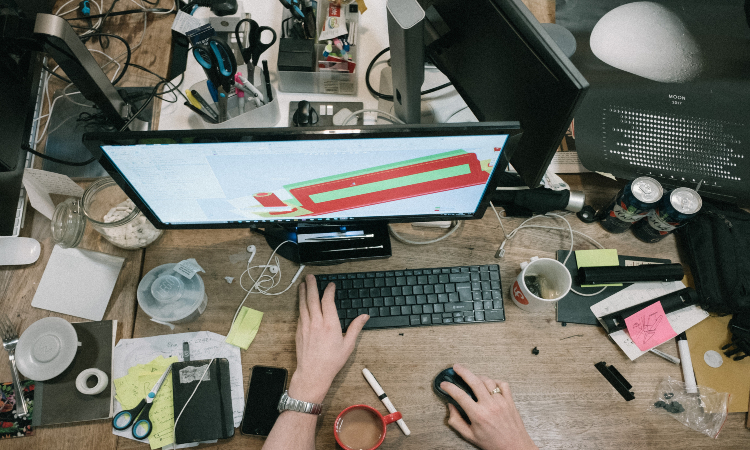Keeping things simple – Why less really is more at work

Photo by Ilya Pavlov
“When you first start off trying to solve a problem, the first solutions you come up with are very complex, and most people stop there. But if you keep going, and live with the problem and peel more layers of the onion off, you can often times arrive at some very elegant and simple solutions.”
Steve Jobs
The Apple genius Steve Jobs knew it. Less really is more. It’s a saying we’ve all heard, and it’s an excellent approach to life in general as well as work in particular. So what, exactly, does it mean in an employment context, and how can you harness simplicity to make your working life better?
A definition of keeping thing simple
According to Merriam-Webster, keeping it simple means making something easy to understand or do, not going into too much detail, and sticking to the point.
Often at the start of a year, we often resolve to do lots of things. But very few of us actually manage to achieve our New Year resolutions. Luckily a literal and figurative clear-out can often help you focus on fewer things more effectively rather than trying to focus on too much at once. It’s actually relatively easy to keep things simple at work, but at the same time the benefits are well worth having. Here are a few ways that can be helpful.
Knowing the amazing power of plain language
Complex corporate speak doesn’t always go hand and hand with intelligence. Complicated propositions, ideas, proposals, reports and so on, can on occasions mean a lack of focus, a lack of preparation, a lack of self-confidence, limited confidence in a product, a service or its price point, even an attempt to blind people with the seeming science of something.
Keep your language simple and a simpler working life should naturally follow. Marketers know the score. They know that the best communications, in every circumstance, are the simplest ones, expressed in the kind of language people use every day rather than corporate jargon. Steer clear of long words when a short word will do. And value candour, a powerful time-saver and saying what you really mean!
Creating critical paths
Keeping things simple can involve creating a thing called a critical path. Imagine you need to do seven different things in one day, for example visiting seven places. You could do them in any old order, but there’s often a logical order that’s a lot more efficient than a purely random approach. Four of your destinations, for example, might be close to one other, so it makes more sense to tick them off first rather than zig-zagging to and fro, driving many more miles and spending a lot more time on the road than you have to.
Setting sensible priorities – clearing the decks

Photo by Robert Bye
It’s essential to be clear about your work priorities so you know exactly what to tackle, in what order, to make your future life easier and more productive. To beat that horrible feeling that there’s far too much to do and nowhere near enough time, list your daily tasks and put them in priority order. Can any of them wait until tomorrow? Sometimes the very act of writing a priority list helps you realise things are not really that complicated after all. Merely organising your inbox, doing your filing and clearing the decks can open up unexpected time and space you never realised you had. The same goes for intelligent delegating.
Treating yourself to essential head-space
Your calendar is a valuable tool in the search for simplicity. Block out some decent chunks of time in advance, some head-space to focus on the more important things and get some strategic thinking under your belt. Do it consciously, book it in way ahead, and don’t overwrite that precious time later on with meetings or anything else. Keep your head-space sacred and you’ll always have the time you need to ponder life, the universe and everything, driving future success.
Knowing why you’re doing what you’re doing
Things often get complex because people forget what question they want to answer. Do you know why you’re doing what you’re doing? Now and then pinning down the why, having a clear picture of the purpose and desired outcome of your efforts, helps enormously in making good decisions and solving problems satisfactorily… and fast The Occam’s Razor principle is a good one. It says that the simplest solution is usually the best, the most effective, the most efficient, and it’s true a surprising amount of the time.
Understanding the weirdness of time

Some people claim that the more they have to do, the more time they seem to have to do it in. It’s a fascinating phenomenon, one that we suspect only applies to the super-organised amongst us. The rare few really do seem to manage to work extraordinarily efficiently and get incredible amounts done without breaking into a sweat or losing the plot.
When you prioritise perfectly, organise your working life so there’s no mess or fuss or confusion, and have what it takes to shut out the rest of the world when necessary, you might find you actually end up with spare time when, beforehand, you felt you were at crisis point. And that’s a brilliant goal to aim for.
Aiming for pure, simple, creative solutions
Humans tend to like complexity, especially in a work context. Complexity can make less-than-confident people feel more confident. We often find it hard to believe that sometimes the simple solutions will actually work. We mistakenly think ‘simple’ is the same as ‘easy’, when they’re actually very different. And we tend to do things the way they’ve always been done because we enjoy life inside our own comfort zones.
The drawing pin. The paper clip. The post-it note. Some of the best ideas in the world are also the simplest. Take a leaf out of their book, clear your decks, simplify your working life, be confident enough to communicate plainly like a marketer. You might find yourself enjoying this new approach and discover a fresh lease of life at work.
If you would like to explore and then experiment with some new ways of keeping things simple at work, do get in touch to discuss the possibility of coaching with us







